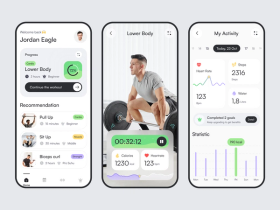How [& When] to Make a Custom Coaching Website?
Published: November 8, 2023
11 min read
In this article, you'll learn:
1
✅ When to Create a Custom Professional Coaching Website
2
⚙️ Main Features for your Custom Coaching Website Development
3
💡 Takeaways
As an experienced coach, you likely have a simple WordPress- or Shopify-based website to present yourself and your services. However, such a solution may not match your coaching business needs as you decide to launch a new product or deepen the level of interaction with your clients.
When using a templated website, you probably won’t be able to implement all the features you need due to the limitations of basic WordPress-like builders. Сustom website development allows you to overcome these obstacles and create a product that perfectly addresses the needs of your customers.
In this article, we will take a closer look at how to create a custom coaching website, when you really need this and share some development tips.
✅ When to Create a Custom Professional Coaching Website
A custom coaching website is much more flexible in terms of available features and design. However, it’s not a silver bullet that solves all the challenges – in some cases, it may be more than enough to have a good old templated website.
In this section, we’d like to describe a few common cases regarding when it’s reasonable to consider custom coaching website creation and when a templated solution may be enough for your goals.
You’re looking for custom website design and functionality
You may come to the point when your current website builder can’t provide you with the required customization level. That usually happens when:
- you’re launching a new product that implies interaction with users — online video or audio courses, live training sessions, interactive tools for self-assessment, etc.;
- you have some ideas on how to update your existing product, however, they can’t be implemented with your current website builder;
- there is no way to implement some web design decisions you want using your current website builder.
As you can see, a custom professional coaching website is often about interactivity. Watching videos, listening to audios, leaving comments, joining calls, sending documents and files, communicating in chats, doing tests and tasks — the more of these and other similar interactions you want to have, the higher the chances are that you need a custom coaching website.
You need special website integrations
If you have some experience working with any WordPress-type websites you probably know the variety of plugins available on these platforms for you to pick from. While they usually cover many popular 3rd-party services, it may not be enough if you need to integrate special coaching tools. Apart from this, even if there is an available plugin, its performance may not be as good as the one you have when using the service itself.
{ rel="nofollow" target="_blank" .default-md}*)](https://cdn.sanity.io/images/ordgikwe/production/e162e84b226e17a367820c25db547c4ebaca2940-1600x1200.jpg?w=1600&h=1200&auto=format)
Website design with integrations is the next level for average coaching websites (image by Chec)
To put it simply, custom integration implies connecting 3rd-party services to your website. These integrations are often needed when it is essential to connect your website with any other platform or system for it to be accessible via your web page.
Let’s say you want to use Salesforce as your CRM system, use Zoom for live calls with customers and integrate online payments via Stripe — custom integrations make this all tech magic work.
Thus, a custom coaching website kills two birds with one stone: it unlocks new integration opportunities and enables a smoother performance of 3rd-party services that you’ve already been using before as plugins.
Cross-platform synchronization
According to Statista, there were 4.66 billion active internet users worldwide, so 59.5% of the global population, as of January 2021. Of this total, 92.6% (4.32 billion) accessed the internet via mobile devices.
In case you are considering making a mobile coaching app or you already have one in use, the main point in creating a custom professional coaching website is making a smooth synchronization between both platforms. This leads to a convenient cross-platform user experience. For example:
- If you provide online courses, users can seamlessly switch between devices — start watching your lesson on their smartphone and then continue where they’d stopped on a desktop device.
- In case you hold live sessions, some users can join them from their mobile devices while others can do the same from your website via tablets or laptops.
The cross-platform can allow you to not miss any potential interest for your product from the mobile-using part of the population.
Better mobile experience
According to WebFx when it comes to mobile experience:
- 74% of people are more likely to return to a website when it is optimized for mobile use.
- 67% of mobile users say they’re more likely to buy a site’s product or service when the website is mobile-friendly.
- 61% of consumers have a higher opinion of companies with a positive mobile experience.
- 52% of customers are less likely to engage with a company because of a bad mobile experience.
After this evaluation, it is clear that a big percentage of visits comes from mobile devices, yet you aren’t ready to produce a full-fledged mobile application? A custom coaching website is easier to adapt for mobile devices and can offer your clients the best mobile experience you can achieve before the app-making stage.
❌ Scenarios When a Templated Website is Enough
As we have already covered the scenarios that lead to creating a custom coaching website, let us mention some cases, when a templated website will be just enough for your business needs.
No expectations in interactions with clients
It all depends on your needs. If the main goal of your website is to present yourself as a coaching expert or to show what services you offer, a simple WordPress- or Shopify-based landing page can be more than enough. This works in case you are not expecting to add any interactive decisions to your website, such as online lecture courses, video conferences, etc.
Proof of coaching business concept
If you need to test the viability of your idea, a templated coaching website is usually more than enough for this purpose.
Let’s say you want to launch your own online coaching courses on your website. You can invest a lot of resources in custom development right away or you can create a simple landing page to determine if your audience is interested in whatever you’re offering in the first place. Such research can show you that for this specific need it is not yet time to consider making a custom coaching website.
⚙️ Main Features for your Custom Coaching Website Development
As we have already spoken about the absence of limitations, let us dive into the vast variety of features you can consider adding to your website.
📋 Sign Up Menu
We recommend improving the sign-up experience by adding the possibility for one-click registration via Google or Facebook accounts. This type of sign-up lets your website visitors save some time.
{ rel="nofollow" target="_blank" .default-md}*)](https://cdn.sanity.io/images/ordgikwe/production/9897b3eaedd4d2585bd2deead48ef101c0744fa8-800x600.jpg?w=800&h=600&auto=format)
Sign up to a website via social media is a time-saver for your client (image by Faustina Puspamurti)
It was reported that by 2021 the average human’s attention span has shortened to 8 seconds. Thus, it’s important to get users through the sign-up stage as quickly as possible so they don’t waste focus on something nonessential for them.
📑 Content Libraries
In case you are planning to sell courses on your website you need to present them all in one place. Thus, your customers will be granted easy access to what you are offering.
{ rel="nofollow" target="_blank" .default-md}*)](https://cdn.sanity.io/images/ordgikwe/production/a341ed6fb836156f65f2d299b668ba59a85e7b81-800x600.jpg?w=800&h=600&auto=format)
Content Library examples (image by Jamie Ritchie)
We suggest you consider creating a separate page where every course and the product you are selling will be displayed. There, you can display the full picture of what you are going to teach your clients. You can include:
- The course title & description
- The number of lessons and/or course length
- The format: live online lessons, pre-recorded videos, etc.
- The cost of the course
- A short presentation of the course
All of this and other similar information will help your customers understand the value of your services and motivate them to purchase whatever course(s) you are offering.
🔍 Filtering and Sorting
It is crucial that among all the listed web courses and products on your website your visitors could find exactly what they are looking for in a nick of time.
{ rel="nofollow" target="_blank" .default-md}*)](https://cdn.sanity.io/images/ordgikwe/production/b9aa9ab1a259f74f6fbf1064a66adec2a288eb3f-1600x1200.jpg?w=1600&h=1200&auto=format)
Add filter templates and inner search engine to ease the learning life of your client (image by Micah Caroll)
For this purpose, you should consider implementing search bars and filters in your content libraries. You can provide your users with various options to sort your offers such as:
- Sort by Relevance
- Sort by Popularity
- Sort by Rating/Feedback
- Sort by Release Date
- Sort by Price
- Sort by Start Date
📇 Student/Coach profiles
To significantly simplify coaching and learning sessions for both sides, present a student/coach dashboard in the personal cabinet of your website. It will grant you, as a coach, access to the following features making your interaction easier:
- Interactive schedule and calendar
- Upcoming sessions reminder
- Information about your latest students
- Access to the feedback your students wrote regarding the course
- Possibility to leave feedback regarding your students’ results
{ rel="nofollow" target="_blank" .default-md}*)](https://cdn.sanity.io/images/ordgikwe/production/c7e6ec73a0512ed11a034e4f194f2ee73197d394-1600x1200.jpg?w=1600&h=1200&auto=format)
Business coach dashboard for a coaching website (image by Yogesh Vaghela)
🛠️ Special Features
Here are some special features that you may use to provide your service online.
📷 Video Conferences
It will be much more convenient to implement your own video call platform so you don't have to deal with a lot of unnecessary information.
Your own platform will let you forget about constant room creation and managing different connection links when you need to have a quick call with your client.
{ rel="nofollow" target="_blank" .default-md}*)](https://cdn.sanity.io/images/ordgikwe/production/0de937b471071b58135346a2d58239e969a15335-1600x1200.jpg?w=1600&h=1200&auto=format)
Digital conference platform to create an online presence without leaving your website (image by Sulton handaya)
Also, it will give you opportunities to create any feature you may need that not every conference platform may provide. The ones you may be interested in include:
- Breakout rooms
- An interactive blackboard
- Unlimited recording
- Screen sharing
🔊 Video/Audio player
When it comes to providing professional guides and courses, it is more convincing and significantly easier to absorb information with audio and video materials. For you to use these contents properly, your platform has to have a good player with basic essential features:
- 5-10 seconds rewind back and forth
- Subtitles
- Volume master
- Video speed management (0.25x, 0.5x, 0.75x, 1x, ...)
- Continuing any lecture from the moment you stopped at last time
{ rel="nofollow" target="_blank" .default-md}*)](https://cdn.sanity.io/images/ordgikwe/production/4e8e02bc8e3711df67c25c6aedadc61a5e44617e-1600x1200.jpg?w=1600&h=1200&auto=format)
Digital player template with matching themes example (image by Gabe Becker)
📌 File Uploading
A file-uploading feature is a necessity for making your coach-student interactions more convenient. For example, it’s a must-have if your coaching business supposes an interaction with your customer by any of these scenarios:
- students share files so you can track their progress;
- you provide some additional information for students’ assignments;
- you provide any extra content during live sessions.
🧩 Quizzes and Tests
In our time, tests and quizzes are some of the most common ways for a coach or tutor to understand:
- The level of students' knowledge in any topic
- The amount of information absorbed after taking a course
- Students’ weak spots that are usually discovered during the learning stage
- The techniques that work the best/the worst
While quizzes and tests remain one of the most efficient methods to grant you, as a coach, access to direct feedback from your students, we recommend you to not overlook adding these features to your website.
{ rel="nofollow" target="_blank" .default-md}*)](https://cdn.sanity.io/images/ordgikwe/production/beacc4c6b1dfbc3f511b77e5d0bf7b9fa728ead4-1600x1200.jpg?w=1600&h=1200&auto=format)
Testing form design examples (image by Anna Lukina)
📆 Easy access to the coach's schedule and booking
Talking about the stage where your website visitor is already interested in what you offer, you should grant them interactive access to your full schedule along with a contact form. This can be presented as a calendar with available dates for consultations and the possibility for users to book a free spot.
{ rel="nofollow" target="_blank" .default-md}*)](https://cdn.sanity.io/images/ordgikwe/production/d29bb405c390eb122ff4aa3bbe1a308ce24e3954-1600x1200.jpg?w=1600&h=1200&auto=format)
The personal contact page on a life coach website (image by Meagan Fisher Couldwell{target=_blank rel="nofollow noopener"}})
🔗 API integrations
Making an API integration means creating a connection between several applications using their application programming interfaces (APIs) to grant them the ability of mutual data exchange.
Nowadays, API integration is a necessity for making your website multifunctional, however, you won’t be able to integrate every feature you want. The main limitation in this kind of integration is that, unfortunately, not every company makes their APIs free or even just available for everyone.
{ rel="nofollow" target="_blank" .default-md}*)](https://cdn.sanity.io/images/ordgikwe/production/ad41252ab1142499f7a15bdbe9494ee46018a146-1600x1200.jpg?w=1600&h=1200&auto=format)
Integration interface example (image by Gauthier Casanova)
For example, here are some professional websites that allow users to connect to their contents for free and whose services you can link to your professional website:
- Dribble
- Gmail
- Trello
- Google Calendar
- Google Drive
- Google Maps
- DropBox
- Zoom
💡 Takeaways
As you can see, a custom professional website can’t and shouldn’t be your go-to in every situation. In some cases, it can just be a waste of time and money since your needs can be completely satisfied by any templated website builder.
Let's briefly summarize the 4 main cases where a custom website is crucial for you to develop:
- If a templated website cannot fulfill your design ideas or certain features you may need can’t be implemented into one.
- If you want to create custom integrations with professional websites or any backend system you have.
- If you want to synchronize your website with a future or current version of an already existing mobile app.
- If you want to provide your users with the best mobile experience without having a fully-fledged mobile product.
If you have any questions or need any help with the development of your Custom Coaching Website, let us know. We will be happy to help you meet your business needs with a stunning Web Product!
Was it helpful?
Read also

How to Create a Fitness App: Process, Costs, Estimates and Challenges

What is Prototyping in IoT and Some Practical Advice

What is IoT Device Management?
Our clients say
![Stormotion client Max Scheidlock, Product Manager from [object Object]](/static/33294af91c38256bcd5a780ddc41861a/b0e74/max.png)
They understand what it takes to be a great service provider, prioritizing our success over money. I think their approach to addressing ambiguity is their biggest strength. It definitely sets them apart from other remote developers.
Max Scheidlock, Product Manager
HUMANOO
